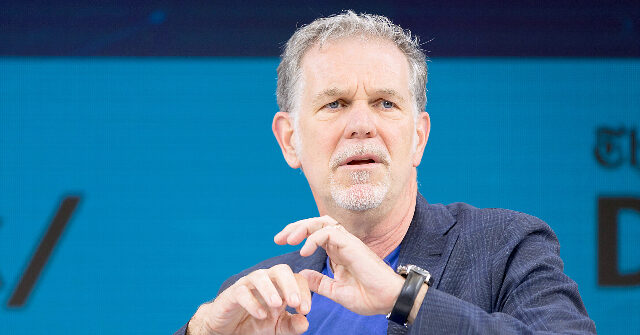Netflix, one of the leading streaming platforms, has experienced a significant rise in subscription cancellations in the United States, particularly after its CEO, Reed Hastings, donated millions to Vice President Kamala Harris’s campaign. According to a report by Bloomberg, this increase in cancelations nearly tripled in the days following Hastings’ public endorsement of Harris on July 23, when he congratulated her in an online post. This surge in cancellations appears to be tied to the backlash from supporters of former President Donald Trump, who took to social media to call for a boycott of Netflix under the hashtag #CancelNetflix. The timing of Hastings’ endorsement coincided with broader discontent among U.S. consumers, many of whom were already reconsidering their Netflix subscriptions due to the company’s decision to phase out its least expensive, ad-free tier.
Hastings’ donation to a pro-Harris super PAC, reported to be $7 million, prompted heightened outrage among many consumers, resulting in Netflix’s largest single-day cancellation rate of the year just three days after his announcement. The sentiment against Netflix was not only politically motivated, but also reflects a growing trend among conservatives to boycott brands that they perceive as aligning with specific political agendas. This is not an isolated incident; Netflix previously faced a similar backlash in 2020 during the controversy surrounding the release of the film “Cuties,” which drew heavy criticism over its portrayal of underage girls and resulted in an influx of cancellations. This history underscores the increasing willingness of consumers to respond to corporate political behaviors with their wallets, suggesting that boycotts can indeed have a tangible impact.
While Hastings’ decision to support Harris and the Democratic Party may be seen by some as exercising his right to free speech and political engagement, the repercussions highlight a more significant trend where audiences are increasingly critical of perceived political positioning by major media companies. Many Americans, particularly conservatives, are growing disillusioned with the entertainment industry, feeling that it does not represent their interests or values. The power of social media in mobilizing such reactions is evident, as users quickly organized and voiced their dissent in response to Hastings’ statements, further amplifying calls for subscription cancellations.
Moreover, the political landscape influencing consumer behavior is becoming even more pronounced among those who feel economically squeezed, particularly during times of inflation. Many individuals are expressing dissatisfaction not only with specific companies like Netflix but with the Biden administration, linking their financial hardships with perceived political missteps and initiatives. Figures like Taylor Swift, who recently endorsed Harris, are facing public scrutiny, with many arguing that wealthy celebrities are out of touch with the struggles of average Americans. This disconnect is further leading to diminished popularity among politically active entertainers, illustrating that consumers are increasingly aligning their brand preferences with their economic realities and political beliefs.
The case of Netflix further emphasizes the growing trend of consumer activism in the digital age, particularly among politically motivated groups. The effectiveness of these boycott movements, as witnessed by the decline in Bud Light sales after a controversial advertisement featuring a transgender influencer, demonstrates that corporate endorsements and political alignments can significantly influence financial outcomes for brands. Many consumers are clearly willing to take decisive action, showing that they can collectively challenge major corporations that they feel do not resonate with their values.
In conclusion, the recent surge in Netflix cancellations following Hastings’ endorsement of Harris encapsulates a broader narrative of consumer engagement and political activism in the streaming industry. As subscription services navigate an increasingly polarized political environment, the backlash from consumers highlights the risks companies face when aligning themselves with specific political figures or ideologies. This development serves as a reminder that today’s consumers, empowered by social media and a culture of instant responsiveness, are more willing to hold corporations accountable for their political actions, potentially reshaping how companies approach marketing and public relations in the future. The intersection of consumer behavior, politics, and media is evolving, indicating that companies must tread carefully as they engage in political discourse.

